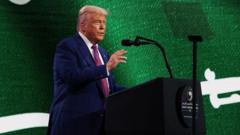President Trump delivered a striking message during an investment conference in Riyadh, Saudi Arabia, asserting that the U.S. would cease its traditional interventionist policies in the Middle East. This announcement resonated widely, garnering applause from the attendees and echoing sentiments of anti-interventionism prominent among citizens across the region. In a speech rich with criticism of longstanding American foreign policy, Trump declared that the days of "giving you lectures on how to live" were over.
Trump's Bold Declaration: No More Lectures for the Middle East

Trump's Bold Declaration: No More Lectures for the Middle East
In a significant address in Riyadh, President Trump promises to halt U.S. intervention in the Middle East, sparking varied reactions across the region.
The president's remarks served to underscore a departure from past U.S. involvement in Middle Eastern nations, where American attempts at nation-building and intervention have often led to instability and conflict. He emphasized the importance of regional sovereignty, encouraging nations to shape their futures independently.
The response to Trump's speech was swift and mixed; various reactions flooded social media in a region marked by skepticism towards U.S. policies. Notable figures, including Saudi academics and citizens from war-torn areas such as Yemen and Syria, expressed a mix of cynicism and cautious optimism regarding the potential end of U.S. sanctions and interventions. Trump's acknowledgment of the mistakes of previous administrations and the call for local governance struck a chord with many, even as the complexities of the region's issues remain daunting.
As the implications of this bold stance unfold, the focus will be on whether this rhetoric translates into policy changes that genuinely respect the autonomy of Middle Eastern nations.
The response to Trump's speech was swift and mixed; various reactions flooded social media in a region marked by skepticism towards U.S. policies. Notable figures, including Saudi academics and citizens from war-torn areas such as Yemen and Syria, expressed a mix of cynicism and cautious optimism regarding the potential end of U.S. sanctions and interventions. Trump's acknowledgment of the mistakes of previous administrations and the call for local governance struck a chord with many, even as the complexities of the region's issues remain daunting.
As the implications of this bold stance unfold, the focus will be on whether this rhetoric translates into policy changes that genuinely respect the autonomy of Middle Eastern nations.






















